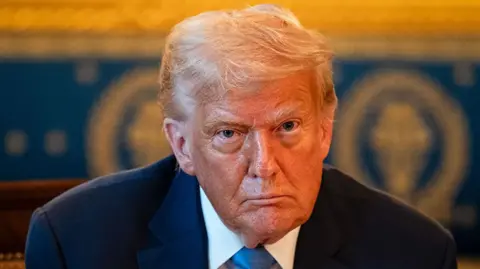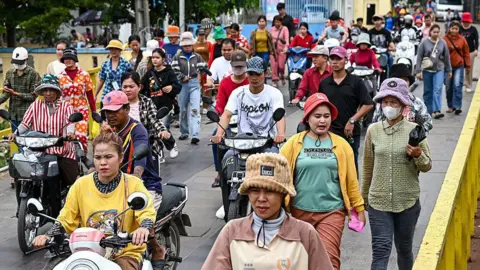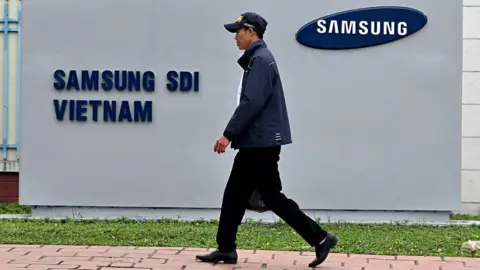Asia is reeling from Trump's tariff salvo – is anyone winning?
 Getty Images
Getty Images"Deeply regrettable" is how Japanese Prime Minister Shigeru Ishiba has described US President Donald Trump's latest tariff threat - a 25% levy on Japanese goods.
Tokyo, a long-time US ally, has been trying hard to avoid exactly this. It has been seeking concessions for its beleaguered car makers, while resisting pressure to open its markets to American rice.
There have been many rounds of negotiations. Japan's trade minister has visited Washington DC at least seven times since April, when Trump announced sweeping tariffs against friends and foes.
And yet, those trips seem to have borne little fruit. Trump's label for Tokyo moved from "tough" to "spoiled" as talks dragged on.
And then this week, Japan joined a list of 23 nations that were sent tariff letters - 14 of those are in Asia. From South Korea to Sri Lanka, many are export-driven manufacturing hubs.
On Friday, Trump announced a 35% tariff for goods imported from Canada.
The president also said he plans to raise blanket tariffs from 10% to up to 20% on most trade partners, dismissing concerns that further levies could push up inflation.
"We're just going to say all of the remaining countries are going to pay, whether it's 20% or 15%. We'll work that out now," he told NBC News.
Countries around the world have until 1 August to strike a deal with the US. But they are likely wondering about their chances given that Japan, a staunch ally that has been openly pursuing a deal, is still facing a steep levy.
Trump has reset the tariffs clock - again. So who is winning, and who is losing?
Winner: Negotiators who want more time
In one sense, almost all of the countries targeted by Trump earlier this year benefit from the deadline extension - they now have another three weeks to strike deals.
"The optimistic case is that there is pressure now to engage in further negotiations before the 1 August deadline," said Suan Teck Kin, head of research at United Overseas Bank.
Growing economies like Thailand and Malaysia, which received tariff letters this week, will be especially eager to seek a solution. They are also caught in the middle of US-China tensions as Washington targets Chinese exports rerouted through third countries, what are known as transhipped goods.
Economists have told the BBC that further extensions are likely, given the complexity of trade agreements.
Countries will need time to implement Trump's demands, which, going by the letters, are not entirely clear, said business lecturer Alex Capri from the National University of Singapore.
For instance, transhipped goods have been specifically levied as part of Vietnam's trade deal with the US. But it is unclear whether that applies to finished goods, or to all imported components.
Either way, it will involve far more sophisticated technology to keep track of supply chains, Mr Capri said.
"It's going to be a slow, long-term and evolving process involving many third parties, tech companies and logistic partners."
Loser: Asian manufacturers
It seems clear that tariffs are here to stay, which makes global trade the loser.
Companies from the US, Europe and China with global businesses remain at risk, Mr Capri said. This hurts not just exporters, but also US importers and consumers.
And it is a blow for the economic ambitions of large parts of Asia, whose rise has been fuelled by manufacturing, from electronics to textiles.
 Getty Images
Getty ImagesIt is unwise to make zero-sum observations on which countries are winning and losing, Mr Capri added, because international trade, especially between US and China is so deeply inter-linked.
Some countries, however, could lose more than others.
Vietnam was the first in Asia to strike a deal, but it has little leverage against Washington, and is now facing levies up to 40%. The same goes for Cambodia. A poor country heavily reliant on exports, it has been negotiating a deal as Trump threatens 35% tariffs.
South Korea and Japan, on the other hand, may be able to hold out longer, because they are richer and have stronger geo-political levers.
India, which too has leverage of its own, has not been issued a letter yet. A deal has seemed imminent but appears to be delayed by key sticking points, including access to the Indian agricultural market and the country's import rules.
Loser: US-Japan alliance
"Despite its close economic and military relationship with the US, Japan is being treated the same as other Asian trade partners," said economist Jesper Koll.
And that could transform the relationship, especially as Tokyo, with its large financial reserves, appears to be ready for the long game.
"Japan has proven to be a tough negotiator and I think that has annoyed Trump," Mr Koll said.
Despite a rice shortage that has sent prices soaring, PM Ishiba has refused to buy US rice, choosing instead to protect domestic farmers. His government has also refused to give in to US demands to increase its military spending.
 Getty Images
Getty Images"They are well prepared," Mr Koll argued. He said the day after Trump announced tariffs in April, Tokyo declared an economic emergency and set up hundreds of consultation centres to assist affected companies.
"Japan will be seeking a deal that is credible," he said, because what's the guarantee Trump won't change his mind again?
With Japan's upper-house election due this month, it would be surprising if a deal is agreed by August, Mr Koll said.
"No-one is happy. But is this something that is going to force a recession in Japan? No."
Winner: US or China?
Asia has long been seen as a key battleground between Washington and Beijing, and analysts say, because of tariffs, Trump may be ceding ground.
For one, given how complex these deals can be, Trump may be overplaying his hand by extending the deadline again, according to some observers.
"The bargaining position of the US has actually been diminished as they have revealed that their hand isn't actually as strong as they would like," said NUS economics professor David Jacks.
And the deals that are made could come at the cost of reshaping trade and ties built over decades.
Trump's choice of posting the letters online, rather than through traditional diplomatic channels, could backfire, said Mr Capri, who described it as "political theatre".
The confusion caused is a "great gift" to China, which is trying to portray itself as a stable alternative to Trump's unpredictability, he added.
But the US market is not easy to replace - and Beijing has its fair share of tensions with countries in this part of the world, from Vietnam to Japan.
China is in the middle of its own trade negotiations with the US, although it has longer to strike a full agreement - until 13 August.
So who will win more friends in this trade war is hard to say, but the race is still on.
“Both parties see the need for a divorce," Prof Jacks said, "but getting there will be tough and involve proceedings which will span years, if not decades."
